The Brain Cancer Treatment Cost in Singapore approximately starts from USD 42500
A brain tumor occurs when there is an unusual development of cells within the brain. There are two types of tumors- benign which are non-cancerous and malignant which are cancerous. The malignant tumor progresses at a rapid speed thereby damaging the brain and its nearby areas. Whereas the benign type of tumors does not grow at a rapid speed. They do cause a lot of pressure on the brain but do not progress rapidly to the surrounding areas of the brain. Patients with brain tumors if left untreated can die and can also affect their ability to lead a normal life.
Singapore houses some of the best hospitals for a brain tumor in the world. The main symptoms of brain tumors are unwanted weakness, seizures, worst headache in the morning, facing a problem while speaking, hearing problems, and many others. The occurrence of brain tumors does not have any specific age. The ones that occur in a child are different from those of an adult. A complete neurological investigation is performed on an individual before the treatment starts. Tests like Computer Tomography (CT Scan), Magnetic Resonance Imaging (MRI), cerebral angiogram, and many other special tests are conducted on an individual to find out where the tumor lies. The tests help the surgeon perform the right kind of surgery on an individual. In today's world microsurgery technology is used when brain surgery is being done.
Brain tumor surgery cost in Singapore can vary between $ 50,000 to $ 70,0000. For benign tumors, it is $50,000 and for malignant tumors, it is $7,00,000. If you are medically insured then your cost lowers down to an extent.
Treatment cost
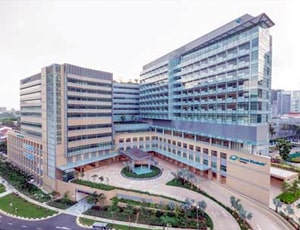
Mount Elizabeth Novena Hospital located in Novena, Singapore is accredited by JCI. Also listed below are some of the most prominent infrastructural details:
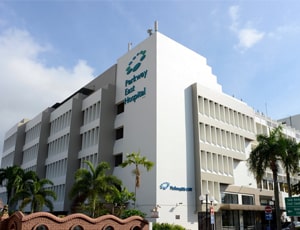
Parkway East Hospital located in Joo Chiat Pl, Singapore is accredited by JCI. Also listed below are some of the most prominent infrastructural details:
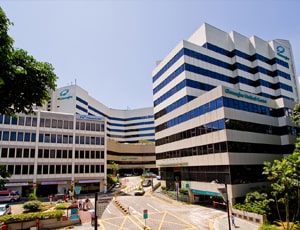
Gleneagles Hospital located in Napier Road, Singapore is accredited by JCI. Also listed below are some of the most prominent infrastructural details:

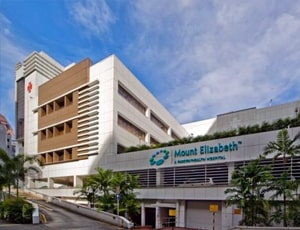
Mount Elizabeth Hospital located in Singapore, Singapore is accredited by JCI. Also listed below are some of the most prominent infrastructural details:
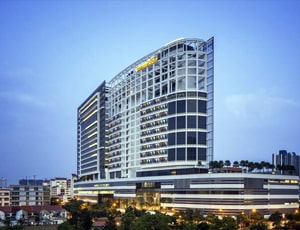
Apart from in-detail treatment procedures available, Farrer Park Hospital located in Connexion, Singapore has a wide variety of facilities available for International Patients. Some of the facilities which are provided by them are Accommodation, Airport Transfer, Choice of Meals, Interpreter, SIM, TV inside room. Also listed below are some of the most prominent infrastructural details:

Types of Brain Cancer Treatment in Sarvodaya Hospital and Research Centre and its associated cost
| Treatment Option | Approximate Cost Range (USD) | Approximate Cost Range (INR) |
|---|---|---|
| Brain Cancer Treatment (Overall) | 5075 - 9122 | 415847 - 745671 |
| Surgery | 3041 - 7101 | 249881 - 584800 |
| Radiation Therapy | 2542 - 6085 | 209095 - 498938 |
| Chemotherapy | 2026 - 5083 | 167115 - 415347 |
| Targeted Therapy | 2537 - 6067 | 208709 - 499269 |
| Immunotherapy | 3033 - 7101 | 249766 - 584493 |
| Palliative Care | 1019 - 3043 | 83325 - 248846 |
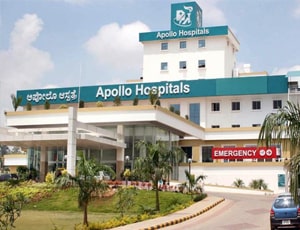
Types of Brain Cancer Treatment in Apollo Hospitals Bannerghatta and its associated cost
| Treatment Option | Approximate Cost Range (USD) | Approximate Cost Range (INR) |
|---|---|---|
| Brain Cancer Treatment (Overall) | 5692 - 10313 | 467817 - 847044 |
| Surgery | 3327 - 7846 | 274675 - 648043 |
| Radiation Therapy | 2754 - 6850 | 228605 - 563914 |
| Chemotherapy | 2228 - 5648 | 183443 - 465095 |
| Targeted Therapy | 2846 - 6714 | 228163 - 558430 |
| Immunotherapy | 3350 - 7915 | 274916 - 643568 |
| Palliative Care | 1135 - 3409 | 92005 - 275852 |
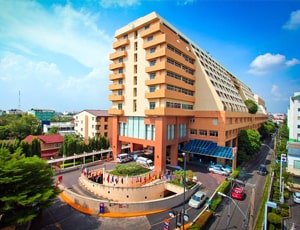
Types of Brain Cancer Treatment in Vejthani Hospital and its associated cost
| Treatment Option | Approximate Cost Range (USD) | Approximate Cost Range (THB) |
|---|---|---|
| Brain Cancer Treatment (Overall) | 13498 - 24749 | 485735 - 869610 |
| Surgery | 7739 - 16544 | 274579 - 590887 |
| Radiation Therapy | 6629 - 13352 | 237343 - 489244 |
| Chemotherapy | 5680 - 11440 | 202503 - 397417 |
| Targeted Therapy | 6869 - 13423 | 245429 - 472319 |
| Immunotherapy | 7814 - 16812 | 275521 - 590627 |
| Palliative Care | 3446 - 7789 | 120482 - 279604 |
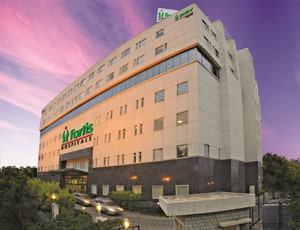
Types of Brain Cancer Treatment in Fortis Hospital and its associated cost
| Treatment Option | Approximate Cost Range (USD) | Approximate Cost Range (INR) |
|---|---|---|
| Brain Cancer Treatment (Overall) | 5074 - 9147 | 414707 - 747904 |
| Surgery | 3052 - 7123 | 250669 - 582131 |
| Radiation Therapy | 2545 - 6063 | 208195 - 497853 |
| Chemotherapy | 2033 - 5062 | 167120 - 416593 |
| Targeted Therapy | 2548 - 6115 | 208003 - 501136 |
| Immunotherapy | 3045 - 7111 | 250773 - 580945 |
| Palliative Care | 1012 - 3046 | 82945 - 249812 |

Types of Brain Cancer Treatment in Zulekha Hospital Dubai and its associated cost
| Treatment Option | Approximate Cost Range (USD) | Approximate Cost Range (AED) |
|---|---|---|
| Brain Cancer Treatment (Overall) | 14745 - 25462 | 53149 - 93819 |
| Surgery | 9022 - 18127 | 32357 - 67128 |
| Radiation Therapy | 7707 - 14439 | 28681 - 53985 |
| Chemotherapy | 6866 - 12525 | 25010 - 45247 |
| Targeted Therapy | 7982 - 14653 | 29519 - 52967 |
| Immunotherapy | 8826 - 18295 | 33382 - 65866 |
| Palliative Care | 4502 - 8950 | 16504 - 33022 |

Types of Brain Cancer Treatment in HCG Kalinga Rao Road and its associated cost
| Treatment Option | Approximate Cost Range (USD) | Approximate Cost Range (INR) |
|---|---|---|
| Brain Cancer Treatment (Overall) | 5079 - 9149 | 415943 - 745472 |
| Surgery | 3057 - 7111 | 248671 - 583503 |
| Radiation Therapy | 2526 - 6107 | 208355 - 501071 |
| Chemotherapy | 2021 - 5070 | 166404 - 418136 |
| Targeted Therapy | 2539 - 6078 | 207398 - 500857 |
| Immunotherapy | 3054 - 7136 | 250552 - 579817 |
| Palliative Care | 1011 - 3035 | 82982 - 250207 |

Types of Brain Cancer Treatment in Zulekha Hospital Sharjah and its associated cost
| Treatment Option | Approximate Cost Range (USD) | Approximate Cost Range (AED) |
|---|---|---|
| Brain Cancer Treatment (Overall) | 14480 - 25779 | 52838 - 96831 |
| Surgery | 9136 - 18045 | 32386 - 66133 |
| Radiation Therapy | 7941 - 14596 | 29526 - 53705 |
| Chemotherapy | 6821 - 12539 | 25172 - 46188 |
| Targeted Therapy | 7954 - 14648 | 28761 - 54461 |
| Immunotherapy | 8828 - 18295 | 32803 - 64790 |
| Palliative Care | 4517 - 9118 | 16668 - 33380 |
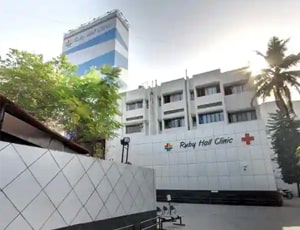
Types of Brain Cancer Treatment in Ruby Hall Clinic and its associated cost
| Treatment Option | Approximate Cost Range (USD) | Approximate Cost Range (INR) |
|---|---|---|
| Brain Cancer Treatment (Overall) | 4716 - 8418 | 379768 - 691318 |
| Surgery | 2786 - 6534 | 228815 - 534573 |
| Radiation Therapy | 2316 - 5553 | 194327 - 457885 |
| Chemotherapy | 1855 - 4630 | 151463 - 380832 |
| Targeted Therapy | 2366 - 5674 | 192414 - 458867 |
| Immunotherapy | 2836 - 6458 | 231583 - 532151 |
| Palliative Care | 938 - 2795 | 76279 - 230859 |
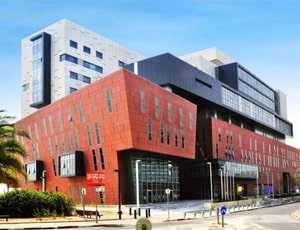
Assuta Hospital located in Tel-Aviv, Israel is accredited by JCI. Also listed below are some of the most prominent infrastructural details:
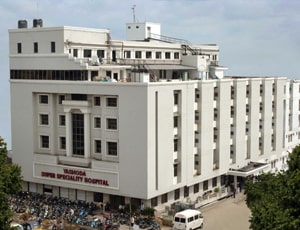
Types of Brain Cancer Treatment in Yashoda Hospital, Malakpet and its associated cost
| Treatment Option | Approximate Cost Range (USD) | Approximate Cost Range (INR) |
|---|---|---|
| Brain Cancer Treatment (Overall) | 5087 - 9112 | 416822 - 749451 |
| Surgery | 3054 - 7123 | 249835 - 581389 |
| Radiation Therapy | 2528 - 6080 | 208268 - 497500 |
| Chemotherapy | 2027 - 5052 | 166866 - 414633 |
| Targeted Therapy | 2530 - 6075 | 207841 - 500611 |
| Immunotherapy | 3033 - 7127 | 250028 - 583559 |
| Palliative Care | 1015 - 3031 | 82989 - 248602 |
The term "brain cancer" describes the abnormal development of brain cells that result in a mass or tumor. It can interfere with normal brain functions such as speech, movement, thoughts, feelings, memory, vision, and hearing. It is a disease of the brain in which abnormal, cancerous cells grow in the brain tissues. Typically, brain cancer is a developed form of a brain tumor. Primary brain cancer or a brain tumor develops from cells within the brain.
However, all brain tumors are not brain cancer. But one thing to note is that even benign tumors can cause serious problems by increasing intracranial pressure or obstructing vascular structures or cerebrospinal fluid flow in the brain.
Different types of cells in the brain such as gliomas, meningiomas, pituitary adenomas, vestibular schwannomas, and primitive neuroectodermal (medulloblastomas) can become cancerous. Gliomas have several subtypes, which include astrocytomas, oligodendrogliomas, ependymomas, and choroid plexus papillomas.
Brain Cancer Causes
The exact brain cancer cause is still unknown. However, its occurrence has been linked to several risk factors, including the following:
There are two types of brain cancer, including:
Metastatic cancer in the brain is more common than primary brain cancer. They are usually named after the tissue or organ where cancer first develops. Metastatic lung or breast cancer in the brain is the most commonly found brain cancer.
Brain Cancer: Grades
Tumors of the brain are assigned under a grade, depending on how normal or abnormal the cells appear microscopically. Grade measurements will help your doctor plan the most suitable treatment for you.
The brain cancer treatment plan is prepared by a medical specialist, who takes note of the cancer type, location, tumor size, patient age, and general health status before coming up with an individualized treatment plan. Typically, brain cancer treatment options include the following:
Ask your healthcare adviser for the best multiple options and choose the one that meets your expectations
On an average, Brain Cancer Treatment in Singapore costs about $42500. Only some of the best and certified hospitals in Singapore perform Brain Cancer Treatment for international patients.
Brain Cancer Treatment package cost in Singapore has different inclusions and exclusions. Some of the best hospitals for Brain Cancer Treatment offer a comprehensive package that covers the end-to-end expenses related to investigations and treatment of the patient. The Brain Cancer Treatment procedure in Singapore includes the fees of the surgeon, hospitalization and anesthesia as well. Post-surgical complications, new findings and delayed recovery may have an impact on the total Brain Cancer Treatment cost in Singapore.
Many hospitals in Singapore perform Brain Cancer Treatment. Some of the most renowned hospitals for Brain Cancer Treatment in Singapore include the following:
While the speed of recovery may vary from patient to patient, they are still required to stay for about 30 days after discharge. This time frame is important to ensure that the surgery was successful and the patient is fit to fly back.
Apart from the cost of Brain Cancer Treatment, the patient is also required to pay additionally for daily meals and guest house accommodation. The per day cost in this case may start from USD 50 per person.
Some of the best cities in Singapore which offer Brain Cancer Treatment are:
After Brain Cancer Treatment, the patient is supposed to stay for about 5 days in the hospital for recovery and monitoring. The doctors team review the patient's recovery during this time with the help of blood tests and imaging scans. Once they feel that everything is on track, the patient is discharged.
The average rating for Brain Cancer Treatment hospitals in Singapore is 2.7. This rating is automatically calculated on the basis of several parameters such as the infrastructure of the hospital, quality of services, nursing support and other services.
There are more than 5 hospitals that offer Brain Cancer Treatment in Singapore. These clinics have propoer infrastructure as well as offer good quality of services when it comes to Brain Cancer Treatment Apart from good services, the hospitals are known to follow all standard and legal guidelines as dictated by the local medical affairs body or organization.
Some of the top medical specialists for Brain Cancer Treatment in Singapore are: